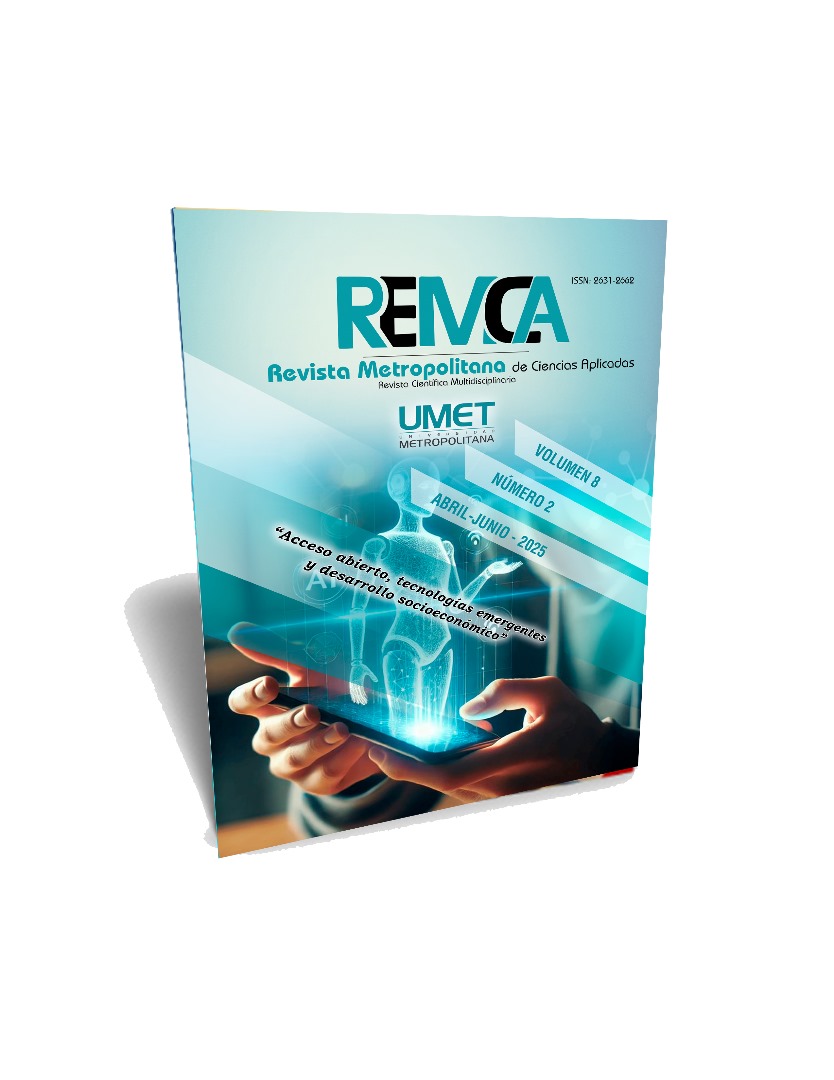Teacher training program using learning analytics to mitigate technophobia in the use of virtual learning environments
DOI:
https://doi.org/10.62452/keag1v59Keywords:
Learning analytics, teacher training, technophobiaAbstract
Technophobia is a phenomenon associated with the rise of the development of digital teaching resources, which permeate the teaching-educational process. The main objective of this research is to develop a teacher training program using learning analytics to mitigate technophobia in the use of virtual learning environments. The methodology used was qualitative, which seeks to transform educational reality. To do so, historical-logical and inductive-deductive theoretical methods were used, and from educational praxis, diagnosis, interviews, expert criteria and Chernoff's faces. The main results were the identification of the majority of teachers suffering from technophobia, the design of a training program adjusted to the ADDIE methodology, the selection through the competence coefficient of the selected experts, in addition, the validation and assessment of the experts based on the readjustment of the training program as a result of the research. It is concluded that a flexible, adjustable, contextualizable training program, where learning analytics has influenced its granting, contributes to the reduction of technophobia among teachers at the higher institute where the research was developed.
Downloads
References
Álvarez Sandoval, B., Freire Morales, D., & Gutiérrez Bascur, B. (2017). Capacitación y su impacto en la productividad laboral de las empresas chilenas. (Tesis de grado). Universidad de Concepción.
Arregui-Valdivieso, V. P., Rivadeneira-Pacheco, J. L., Avilés-Almeida, P. A., & Medrano-Freire, E. L. (2024). Desarrollo Profesional y Formación Continua en la Educación: Estrategias efectivas para potenciar el rendimiento del Personal Académico . MQRInvestigar, 8(1), 5343–5363. https://doi.org/10.56048/MQR20225.8.1.2024.5343-5363
Ferguson, R., & Clow, D. (2019). Where is the evidence? A call to action for learning analytics? (Ponencia). 8ª Conferencia Internacional sobre Análisis de Aprendizaje y Conocimiento. New York, USA.
Greller, W., & Drachsler, H. (2019). Translating learning into numbers: A generic framework for learning analytics. Journal of Educational Technology and Society, 22(2), 42–57. https://www.saair-web.co.za/wp-content/uploads/2016/10/Geller-and-Drachsler-2012-Translating-learning-into-numbers-Framework-for-LA-Edu-Tech-15-p42-57.pdf
Habermas, J. (1999). Teoría de la acción comunicativa. Grupo Santillana de Ediciones, S.A.
Hernández Sampieri, R., Fernández Collado, C., & Baptista Lucio, P. (2018). Metodología de la investigación (6ª ed.). McGraw-Hill.
Hernández, F., & David, M. (2021). Sistematización de una experiencia de aprendizaje: uso del modelo Addie para el diseño de un curso virtual. (Tesis de maestría). Universidad ICESI.
Ifenthaler, D., & Yau, J. Y. (2019). Using learning analytics to support academic success. Journal of Educational Technology and Society, 68, 1961-1990. https://link.springer.com/article/10.1007/s11423-020-09788-z
Jiménez, J. C. (2020). Polémicas Educativas en Confinamiento. Revista Internacional De Educación Para La Justicia Social, 9(3). https://revistas.uam.es/riejs/article/view/12084
León-Ramentol, C. C., Menéndez-Cabezas, A., Rodríguez-Socarrás, I. P., García González, M. C., Quesada Leyva, L., Quintana Verdecia, E., León-Ramentol, C. C., Menéndez-Cabezas, A., Rodríguez-Socarrás, I. P., García González, M. C., Quesada Leyva, L., & Quintana Verdecia, E. (2021). La capacitación como premisa para implementar un sistema de gestión de la calidad. Edumecentro, 13(2), 19–32. http://scielo.sld.cu/scielo.php?script=sci_arttext&pid=S2077-28742021000200019
Maribe, R. (2009). Instructional designe: The ADDIE Aproach. Springer US.
Morales González, B. (2022). Instructional design according to the ADDIE model in initial teacher training. Apertura, 14(1), 80–95. https://doi.org/10.32870/ap.v14n1.2160
Ramírez, L. (2020). El impacto de la capacitación en la satisfacción laboral. Ediciones Laborales.
Rodríguez-Gómez, M. J. (2021). El impacto de la formación continua en el desarrollo profesional de los individuos. Revista de Formación Continua, 25(3), 67-82.
Sánchez González, M., Miró Amarante, M. L., Ruiz Rey, F. J., & Cebrián de la Serna, M. (2021). Evaluación de programas online de capacitación docente sobre innovación y competencias digitales durante la Covid-19: #webinarsUNIA. RIED. Revista Iberoamericana de Educación a Distancia, 25(1), 121–140. https://doi.org/10.5944/ried.25.1.30763
Tomalá Uribe, J. I., Saenz Romero, Y. S., Mite Mejía, C. I., & Palacios Meléndez, J. G. (2023). Incidencia de la capacitación profesional en el desarrollo empresarial de las pymes del sector industrial de Durán. Ciencia Latina Revista Científica Multidisciplinar, 7(3), 3551–3563. https://doi.org/10.37811/cl_rcm.v7i3.6425
Valle Lima, A. D. (2007). Metamodelos de la investigación pedagógica. Instituto Central de Ciencias Pedagógicas.
Downloads
Published
Issue
Section
License
Copyright (c) 2025 José Luis Zhunio-Ordoñez, Luis Tarquino Vinueza-Rodríguez, Raúl López-Fernández, Rosangela Caicedo-Quiroz (Autor/a)

This work is licensed under a Creative Commons Attribution-NonCommercial-ShareAlike 4.0 International License.
Authors who publish in Revista Metropolitana de Ciencias Aplicadas (REMCA), agree to the following terms:
1. Copyright
Authors retain unrestricted copyright to their work. Authors grant the journal the right of first publication. To this end, they assign the journal non-exclusive exploitation rights (reproduction, distribution, public communication, and transformation). Authors may enter into additional agreements for the non-exclusive distribution of the version of the work published in the journal, provided that acknowledgment of its initial publication in this journal is given.
© The authors.
2. License
The articles are published in the journal under the Creative Commons Attribution-NonCommercial-ShareAlike 4.0 International License (CC BY-NC-SA 4.0). The terms can be found at: https://creativecommons.org/licenses/by-nc-sa/4.0/deed.en
This license allows:
- Sharing: Copying and redistributing the material in any medium or format.
- Adapting: Remixing, transforming, and building upon the material.
Under the following terms:
- Attribution: You must give appropriate credit, provide a link to the license, and indicate if any changes were made. You may do this in any reasonable manner, but not in any way that suggests the licensor endorses or sponsors your use.
- NonCommercial: You may not use the material for commercial purposes.
- ShareAlike: If you remix, transform, or build upon the material, you must distribute your creation under the same license as the original work.
There are no additional restrictions. You may not apply legal terms or technological measures that legally restrict others from doing anything the license permits.




